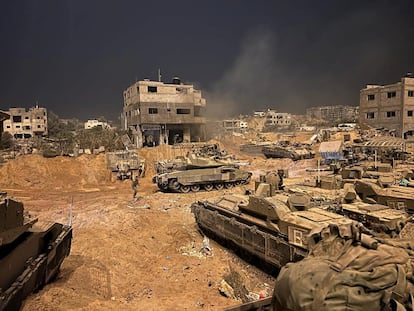Israel claims to have cut off access from north to south of Gaza Strip after surrounding the capital
There were new airstrikes against the Jabaliya refugee camp. Israeli PM Netanyahu said the war will be ‘long and difficult’ following the death of 16 soldiers


The war in Gaza will be “long and difficult,” as Israeli Prime Minister Benjamin Netanyahu reiterated this Wednesday, following the death of at least 16 soldiers in the enclave, but it seems to be progressing faster than expected, according to military leaders’ statements to defense analysts working for the Israeli media. In the midst of the confusion caused by the so-called “fog of war,” aimed at confusing the enemy, Israeli troops have reportedly already cut off access between the north and south of the Palestinian coastal territory after surrounding the capital, Gaza City, with tanks and infantry forces. Since October 7, when Hamas militias killed 1,400 Israelis and kidnapped 220 people, the Israeli Armed Forces have attacked 11,000 targets in the Gaza Strip. Since then, the Gaza Ministry of Health has reported nearly 8,800 deaths, almost 3,650 of them children and teenagers.
It is difficult to independently verify this information, as Gaza is off limits to the foreign media and telephone and internet communications were cut off for the second time since Friday — they were restored on Sunday — due to the damage suffered by the company’s international communication center, Paltel. The death of dozens of people in Tuesday’s attack on Jabaliya, a refugee camp erected in 1948 with tents and now transformed into a sprawling neighborhood on the northern outskirts of Gaza City, represents one of the deadliest tolls of the conflict in a densely populated residential area. The Qatari television network Al Jazeera reported on Wednesday that there was a new Israeli airstrike with victims in the Fallujah district of Jabaliya. Sources from the Palestinian emergency services told Agence France Presse that a new bombing had occurred in the largest refugee camp in the north of the enclave. The Islamic resistance movement, which also blamed Israel for the new air raid on an urban area, has claimed that seven of those killed in Tuesday’s attack were hostages captured in Israel, including three with foreign passports. Given the increase in attacks in civilian areas, Jordan ordered the recall of its ambassador in Tel Aviv on Wednesday.
Military spokesmen announced that the ground offensive in Gaza has been reinforced through joint operations with naval and air forces. Troops on the ground are almost instantly pinpointing targets for artillery, aviation and warships. The Israeli Armed Forces claim to have destroyed observation posts, anti-tank missile units and rocket launching ramps. On the night of Tuesday to Wednesday, “hand-to-hand combat” focused on underground command centers of the Izz ad-Din al-Qassam Brigades, the armed wing of Hamas, according to the chief military spokesman, Rear Admiral Daniel Hagari. On Tuesday, nine soldiers died when the armored vehicle in which they were traveling inside the Strip was hit by a Kornet missile. Two others died when their tank ran over an explosive device. At least four more died in combat this Wednesday.
Missile ships in the Red Sea
Israel has also reinforced security in the Red Sea with the deployment of missile ships, after the threat suffered on Tuesday in the tourist city of Eilat. Israel’s air defense systems intercepted two missiles and a drone directed from Yemen by the pro-Iran Houthi militia against that resort town in the south of the country, where more than 60,000 Israelis have been evacuated from areas near the borders with Gaza and Lebanon. The Houthi rebels have broadcast images of the launch of missiles and suicide drones aimed at Israel through the Yemeni television channel Al Masirah.
In the hospitals of the Gaza Strip, the humanitarian situation has worsened in recent hours as fuel reserves for electric generators in large centers such as the Shifa health complex, in the capital, are about to run out. The Turkish-Palestinian Friendship Hospital, the only one in Gaza that treats cancer patients, has stopped operating after running out of fuel and suffering damage from Israeli attacks these days.
On the northern front, an unidentified Lebanese armed group attempted to launch several anti-tank missiles from Lebanese territory towards Israel, but was neutralized by an Israeli tank, according to military sources. In addition, another Lebanese armed group opened fire from Lebanon towards Israeli territory in the Yiftah area without causing any casualties, the Israeli army said, noting that troops opened fire towards the area where the shots originated. The border between Lebanon and Israel is experiencing its most tense moment since 2006, when Israeli troops and the Lebanese Shiite militia Hezbollah fought a 34-day war.
Although this escalation on the northern front is still considered “low intensity,” the death toll is also unprecedented since 2006, with the majority of fatalities in the ranks of Hezbollah. Since October 8, at least 71 people have died on both sides of the Blue Line, the boundary established by the U.N. after the last war, according to the Efe news agency. In Lebanon, at least 63 people have died: 49 members of Hezbollah, six members of Palestinian militias who also launched attacks and eight civilians, including a Reuters cameraman. On the Israeli side, the casualties are seven soldiers and one civilian.
Sign up for our weekly newsletter to get more English-language news coverage from EL PAÍS USA Edition
Tu suscripción se está usando en otro dispositivo
¿Quieres añadir otro usuario a tu suscripción?
Si continúas leyendo en este dispositivo, no se podrá leer en el otro.
FlechaTu suscripción se está usando en otro dispositivo y solo puedes acceder a EL PAÍS desde un dispositivo a la vez.
Si quieres compartir tu cuenta, cambia tu suscripción a la modalidad Premium, así podrás añadir otro usuario. Cada uno accederá con su propia cuenta de email, lo que os permitirá personalizar vuestra experiencia en EL PAÍS.
¿Tienes una suscripción de empresa? Accede aquí para contratar más cuentas.
En el caso de no saber quién está usando tu cuenta, te recomendamos cambiar tu contraseña aquí.
Si decides continuar compartiendo tu cuenta, este mensaje se mostrará en tu dispositivo y en el de la otra persona que está usando tu cuenta de forma indefinida, afectando a tu experiencia de lectura. Puedes consultar aquí los términos y condiciones de la suscripción digital.








































